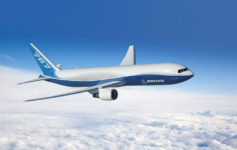Boeing’s long-anticipated 777-X program just got a big boost with the start of certification flights. Here’s what those test flights say about Boeing, the FAA, and the future of air travel.
If you are considering booking travel or signing up for a new credit card please click here. Both support LiveAndLetsFly.com.
If you haven’t followed us on Facebook or Instagram, add us today.
Certification Flights Begin for the 777-9
Under development for more than a decade, Boeing’s response to the Airbus A350, has dragged on but is now on final approach to landing in customer fleets. The certification process for the very large wide-body jet came through in January, but a lot has happened since then.
“With type inspection authorization for the 777-9, we began certification flight testing with US Federal Aviation Administration personnel on board the aircraft” on the evening of 12 July, Boeing says. “The certification flight testing will continue validating the airplane’s safety, reliability and performance.” – Flight Global
Independently of these official flights, Boeing has been testing for months. I reached out to Boeing after spotting the 777-9 flying over Florida waters based at Regional Southwest Florida International Airport, but they were not prepared to answer questions or offer a tour at that time. They disclosed that the aircraft was filled with testing equipment, as is customary.
It’s an important step to keep the program on track from its latest assessment that the type would be delivered in 2025.
“The start of certification testing also comes as welcome news to 777-9 customers, including Lufthansa and Emirates Airline, which are expected to be the first two airlines to receive the type.
Though Boeing has stuck to its 2025 certification timeline, Emirates president Tim Clark speculated several months ago that his company may not get its first 777-9 until 2026.” – Flight Global
Boeing, one of the nation’s largest exporters and contributors to GDP, has also sold a smaller 777-8 though that variant is all but exclusively destined for cargo. A 777-10 is in the works too but doesn’t appear to be close to market.
FAA Separates Manufacturing Issues From Boeing
What’s most important for Boeing, operators, and the flying public is that the Federal Aviation Administration is evaluating each aircraft and its design, assembly, and testing as individual products. The 737-MAX program has had a litany of issues, some of which were fatal, others nearly fatal, and exposed significant issues by subcontractors in the construction of those jets. It also placed the company under scrutiny for its managing of the final inspection and assembly of those aircraft.
But what the FAA signaled both in January and now with these official certification flights is that the model is being evaluated separately from other products at Boeing. As it should be. The 737-MAX troubles are not the same as Boeing slowing its progress and being deliberate on the 777-X projects. The manufacturer broke ground on a new facility for wing production and manages it in-house as it’s distinct enough from prior models that it warrants its own plant.
Air Travel Market Future
It’s critical, both for the US economy but also for global competitiveness, for Boeing to succeed on a scale that’s akin to major rivals like Airbus. It’s also crucial that the flying public understands that while this model and process may need more attention, that one is doing just fine.
Airlines have an exposed vulnerability with just one suitable manufacturer in the marketplace. They are beholden to that manufacturer for advancements in technology, improvements in efficiency, for delivery of new equipment and parts for existing equipment. They need at least two major builders to compete on price and features, to jockey for better delivery schedules, and to avoid complacency.
Consumers also benefit from a more robust market, without competition, would Airbus have any reason to remain competitive on pricing? Airlines certainly won’t absorb those higher capital costs and continue to invest in their fleet without passing it off to consumers.
More importantly, it allows warranted concerns about the 737-MAX and Boeing’s (now, criminal) process to be examined carefully without unnecessarily delaying a competent product the market needs.
Conclusion
The 777-9 certification flights signal a few great things for Boeing, the FAA, airlines, and consumers. It indicates that the 737-MAX has not been given the green light to move forward because the process is not sound but the 777-X, under incredible scrutiny, is. It shows that the FAA can evaluate things fairly as opposed to a broad brush and that Boeing can and is applying the proper attention to detail on at least the 777-X project. It also keeps two competitors bidding for airlines and airlines bidding for the best deal to keep consumer prices low and shareholder value high.
What do you think?




We all agree that it’s bad for the marketplace to have only one manufacturer. But why don’t we apply the same scrutiny to the fact that each manufacturer only has one regulator, and that FAA has an effective monopoly on aircraft certifications in the United States? We have multiple private safety agencies certifying all manner of products, and there is no reason why the FAA should be the only resource to certify an aircraft. The 777-X may or may not be safe, but it shouldn’t take this long to find out, and the FAA’s failure to put together a coherent certification process is the only reason why we don’t know the answer yet, causing massive dead weight loss to the world aviation industry and every single company and individual that relies on it . . . which is basically the entire world. Boeing has a scandal on it’s hands with the 737-Max, but nobody is interested in the equivalent scandal inside the FAA and the massive cascading government failures that have no end in sight. The USA will never build another world beating passenger aircraft again without massive reform of the certification process . . . nobody will invest in a 15 year process and all of this manufacturing will necessarily move offshore to Europe, China, and Brazil.
The current regulator is a big bureaucracy , and the current manufacturer is also a big bureaucracy , and the big airlines are also big bureaucracies .
Bureaucracies have many mobile phone tech addicts who believe AI is “an advance” .
Is surprising they are not agile nor clever ?
@Mak, @Alert
Yes, because nothings increases public safely like adding a profit margin to a third party private middle man. I can pretty much guaranty you than any non-government third party which is allowed to certify planes is going to demand—and receive—a total guarantee of indemnification and defense of their certification errors from the U.S. government aka the taxpayers. The scheme will result in privatizing business profits while socializing business risks and losses.
@InLa Like so many people who argue in favor of failed government solutions you have no imagination and so are stuck in your thinking. Putting to one side that the costs of the FAA aren’t free and come with massive negative externalities to the entire world economy, many certification organizations operate as non-profits (i.e., NSF, CSA), nearly every electric product in our home is certified by a private company (i.e., UL), and the maritime industry is primarily run with private sector certifications (in fact some countries bring in private companies to run their ship certification programs). There is no reason why government needs to certify planes, particularly because they have done such an extremely poor job of it, not only with huge delays but also a massive body count. Unlike the FAA which is totally unaccountable and won’t be punished in any way if it certifies a bad plane – or fails to certify a good one – insurers have a massive financial interest to make sure that planes are safe before they insure them. There is no question that a private sector certification industry would develop if the FAA made space for them. The FAA is a horrible failure and what precisely the private sector alternative looks like I can’t say precisely, but the chances that it would be better than the failed FAA are extremely high.
77x isn’t an answer to the A350. Airbus manufactures nothing similar. It’s just the next widebody to go to market.
Yeah, I feel like 777x’s is an answer to the void that the A380s and 748s will leave behind
Nothing is good enough to replace the 748 .